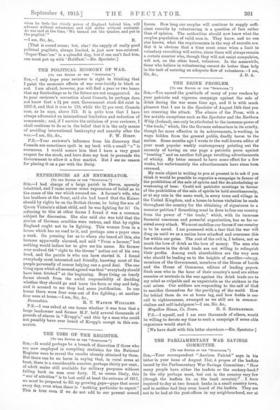THE DRINK PROBLEM.
[To TRD EDITOR OP TUR " SPECTATOR."] Sin,—Yon earned the gratitude of many of your readers by your patriotic and vigorous campaign against the sale of drink during the war some time ago, and it is with much pleasure that I see in the Spectator of August 14th that you are renewing the attack. The silence of the Press, with a few notable exceptions such as the Spectator and the Northern Whig (Ireland), can only be.attributed to the immense power of "the trade," which, like the German submarines in its cruelty,
though far more effective in its achievements, is working, in ways hidden from the general public, deadly havoc to the nation. Some months ago I wrote to the well-known editor of your most popular weekly contemporary pointing out the anomaly of having on one page a patriotic poem against " treating " and on another full-page revolting advertisements of whisky. My letter seemed to have some effect for a few weeks, but unfortunately the advertisements have since been resumed.
My main object in writing to you at present is to ask if you think it would be possible to organize a campaign in favour of
the prohibition of the sale of spirits and the de-alcoholising or weakening of beer. Could not patriotic meetings in favour of the prohibition of the sale of spirits be held simultaneously.
or at any rate in the same week, in every town and village in the United Kingdom, and a house-to-house visitation be made throughout the country for the obtaining of signatures to a monster petition P Something must be done to free our country from the power of " the trade," which, with its immense financial resources and powerful organization, has so far re- sisted every attack. We must mobilize our forces if our country
is to be saved. I am possessed with a fear that the war will drag on until we as a nation have attacked and overcome this foe within our gates. The root of the evil is, I believe, not so much the love of drink as the love of money. The men who have shares in the drink trade are not willing to relinquish
their profits. Among such shareholders are the very men
who should be leading us to the heights of sacrifice—clergy, members of the Government, members of the House of Lords
and the House of Commons, editors of leading papers.
Such men who in the hour of their country's need are either enemies or neutrals in the war against the drink trade are to
my mind as culpable and as unpatriotic as the strikers in the coal mines. Our soldiers are responding to the call of God to sacrifice themselves for the purifying of the world. How far behind them do we at home lag, and how feeble is our call to righteousness, swamped as we still are in commer- cialism and self-indulgence!—I am, Sir, &c., P.S.—I myself, and I am sure thousands of others, would be willing to devote my time to such a campaign if some able organizers would start it.
[We have dealt with this letter elsewhere.—ED. Spectator.]


































 Previous page
Previous page